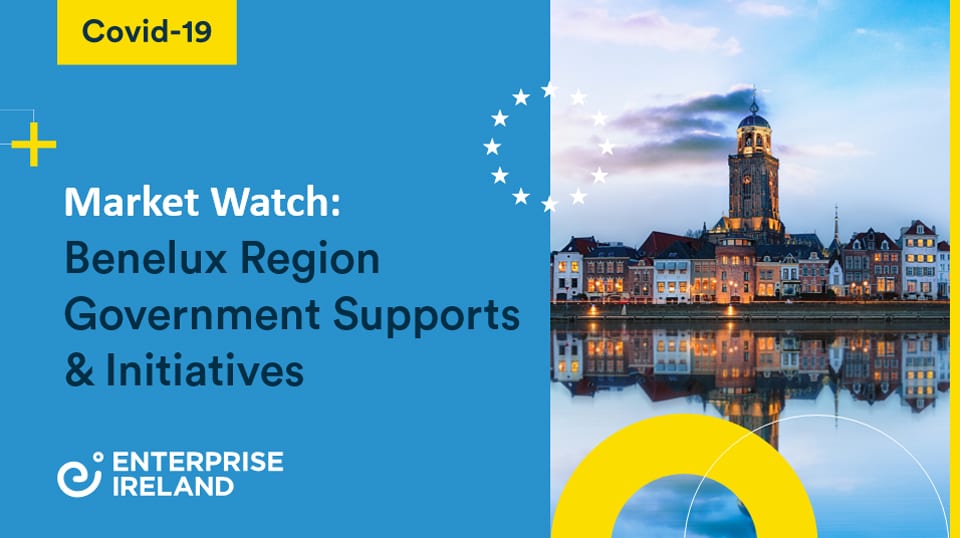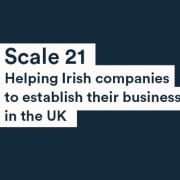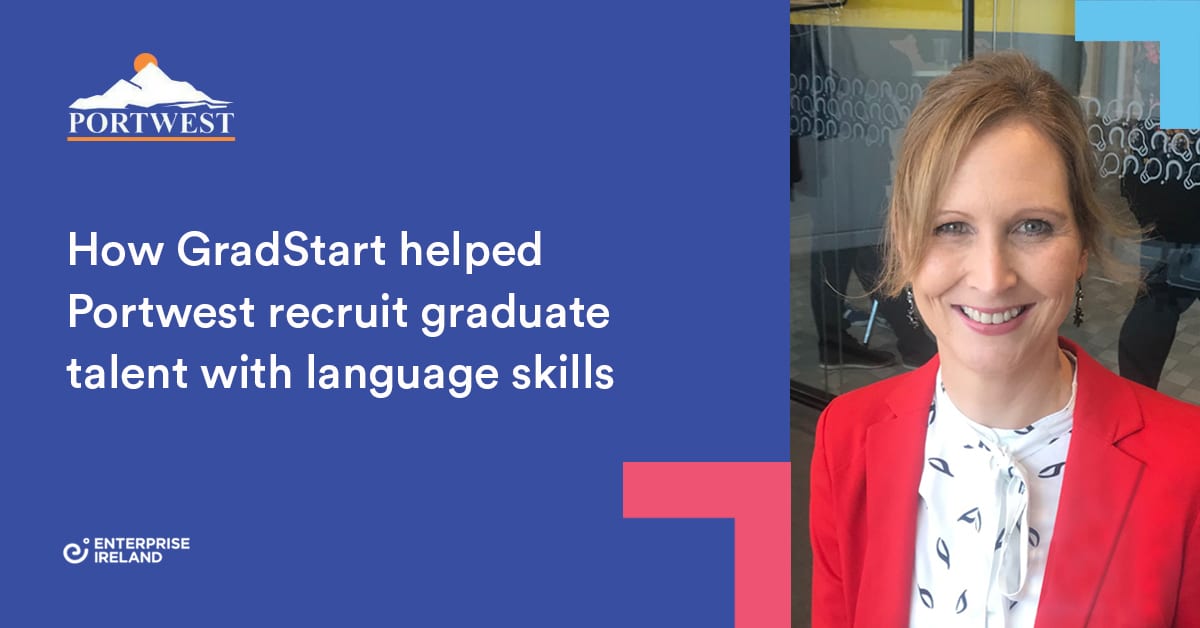Innovation and creativity in a time of crisis
The Covid-19 crisis has brought out the best in Irish companies, which are facing the crisis with a range of innovative solutions.
Repurposing production lines to manufacture personal protective equipment (PPE)and hand sanitiser, new digital healthcare apps, and the rapid development of new test kit componentsare just a few of the many highly innovative responses to the Covid-19 crisis that have emerged from Irish companies in recent months.
“It’s amazing how resourceful and creative people become when they are challenged,” says Enterprise Ireland, Divisional Manager for Innovation & Competitiveness, Tom Kelly. “We are seeing companies innovating, adapting and creating new solutions and product lines in response to the crisis.”
Pivoting business to address a need
He points to the shortage of hand sanitiser products as an example. “The need for a massive increase in supplies was one of the earliest instances. Several companies repurposed their existing systems to manufacture them. Mervue in Cork partnered with Irish Distillers and is selling directly into the HSE. EPC in Clara, Co Offaly manufactures medicated toothpaste, but has set up a completely new line for sanitisers; it went to Grants in Tullamore to secure a supply of alcohol. EPC is also selling into the HSE and other markets. That story has been repeated by other companies like Univet, Chanelle and Ovelle.”
The shortage of PPE is also being addressed. “Irema Ireland ramped up production to increase supplies of high-quality surgical and respiratory masks,” says Kelly. “Other companies are looking at aprons and gowns, but that’s still at an early stage.”
“From a standing start, we have seen a number of companies like Key Plastics step up to manufacture face shields for use in the health service. The engineering sector has been particularly responsive” says Kelly.
Moving into the lab, Aalto Bio Reagents is manufacturing a nucleocapsid protein for diagnostic tests. This is known as a lysis buffer, which is used for the purpose of breaking open cells. “Aalto Bio Reagents worked very closely with the HSE and the National Virus Reference Laboratory and came up with a formulation within a week. Serosep is another company that is manufacturing test kits. You have to recognise the courage and capability of companies like that. What they are doing is the result of an innovative mindset, which is serving the country very well at present.”
It is not only established companies that are making a contribution. Enterprise Ireland-supported high potential start-up (HPSUs) are also playing their part. “CALT Dynamics in Wicklow, a 3D printing start-up in Ireland, are printing 3D printable protective visors that could help to bridge the shortfall of PPE both in Ireland and overseas,” says Enterprise Ireland, HPSU Manager, Industrial & Lifesciences Alan Hobbs. “It has linked up with Automatic Plastics in Tinahely and is now supplying products to a number of hospitals.”
Digital Health
These early-stage companies are making a particular mark in the digital health realm. “We’ve been seeing a distinct uptick in that area,” says Hobbs. “A number of Irish companies have secured contracts with the HSE, and with other health services. We now have a cohort of innovative young Irish start-ups that have just secured their first reference sites in the domestic market. This is very important, because when they go abroad, they will get asked about sales at home.”
One such company is practice management software developer Wellola. It has launched a secure patient communication portal for the HSE that enables GPs to treat people remotely if possible.
Meanwhile, all appointments at Covid-19 urgent test centres are scheduled using software from another innovative Irish firm, Swiftqueue. “Patients don’t realise that this is being done on Irish-developed software,” says Hobbs.
These are just a few among many new healthcare solutions being brought to market by Irish firms, according to Hobbs. “PMD Solutions is trialling new respiratory monitoring technology with Beaumont Hospital at the moment. This fits in with the HSE strategy of shifting care into the community, and it takes a lot of the stress off hospitals. Jinga Life’s technology for the e-transfer of CT scans means less handling of CDs and so on, and it also reduces risk of infection. Finally, patientMpower provides the tools for patients with lung complaints to be followed remotely with integrated medication management. The company is also providing a new remote triage service for Covid-19 patients in the home.
“There is also an impact on supply chains. Having companies doing these things locally makes a huge difference to delivery times.” says Hobbs.
Looking to the future, Kelly says the Covid-19 crisis is likely to change the way we think about healthcare supply chains. “We already recognise the need for food security and energy security. It is becoming increasingly obvious that healthcare security has to be viewed in the same way.”
To learn more about the steps companies can take to address the impact of Covid-19 visit our business supports page.
Market Watch – A view from North America
North America, like the rest of the world, has been seriously impacted by the outbreak of COVID-19 and Sean Davis, Enterprise Ireland Regional Director of North America, says while there is no certainty in business at the moment, Irish exporters should seek to reassure their US customers.
Key Takeaways
- The situation is changing daily but most states are operating on a work-from-home basis.
- Travel and supply chain disrupted in many areas.
- Irish exporters are advised to keep in contact with their North American clients, be aware of their situation and the need to communicate more personally via telephone or video link.
- Business is still moving so Irish exporters are encouraged to adapt where possible and utilise time wisely in order to be ready for any business which should arise.
“It’s an evolving situation across North America but for the most part there are work-from -home requirements in most jurisdictions across both the US and Canada,” he says. “Travel is heavily restricted, and there is some supply chain disruption, also your customers are busily working to stabilize their own businesses. There is also uncertainty and fear of the unknown, along with customer cash flow disruption and in some cases contract negotiations frozen.
“With this in mind the focus of activity for Irish exporters should be around three pillars – stabilise, reset and recover, which in the immediate term, means stabilise. So staying close to customers and key strategic partners is vital, as is being aware of their situation, i.e. in addition to shared commercial challenges being able to connect by having an understanding of the specific impact of this crisis in their town or city is an important demonstration of empathy at a critical time
“We are seeing instances where contacts in some NA companies we are close to have been directly and profoundly affected personally by Covid-19, so again situational awareness is important and as much as possible communication needs to be via telephone or video conference as it is much more personal, empathetic and engaging.
“But brevity is key when it comes to the US and while many people are working from home, they are still time poor, so it’s important to keep things brief – to quote Franklin D. Roosevelt ‘Be sincere, be brief, be seated’.”
Davis says that the Reset and Recover phases will be more successful if companies use the stabilise period to accumulate as much market and customer intelligence as possible.
“This is an important time to identify where your company and product offering might have to pivot in order to be ready,” he advises.
“North America is an enormous economy, over $25TRN, and the US is the second largest single export market for Irish companies so despite the challenging times there will be huge market opportunity to develop as we recover and re-emerge. So any movement which demonstrates a willingness, where possible, to share some of the burden created by cash flow or credit terms is beneficial.” says Davis.
“But don’t over-extend your company’s credit terms either; this is a rapidly evolving situation and cash flow is crucial. Any Irish companies with an in-market presence and employing in the region, especially those with significant deployment, should be actively looking at what supports are being made available whether through economic stimulus packages or through funds available to support key sector strategic priorities within a country, state or province.”
Enterprise Ireland has seven offices across the region with teams ready to support their client companies throughout this journey.
“We have developed and completed a six-part webinar series called “Reliance and Adaptability in Extraordinary Times” led by a series of key opinion leaders in areas such as Leadership and Communication, Crisis Communication and Creating a New Narrative,” says Davis. “Our teams are working on a one-to-one basis with clients through key areas and deliverables. And for significantly impacted sectors, we have delivered, and are working on, other webinars bringing client companies and subject matter experts together.
“On a weekly basis, we are gathering market and sector intelligence which is being collated centrally in HQ and distributed via our colleagues in Ireland to client companies.”
While not all sectors are impacted equally, Davis says there are still opportunities available and companies are still signing new business by solving problems, delivering innovation and fostering good partnerships
“Not everything has ground to a halt,” he says. “So I would advise companies to pivot effectively, use our market research centre as it’s a prime time for under-utilised members of staff to build valuable market intelligence or look at opportunities in other North American geographies you have not previously considered.”
“North America is a vast economic and geographical landscape which is likely to emerge from the current crisis in different stages and in different states (US) or provinces (Canada), hence some markets are likely to enter that Recover phase sooner than others and our network will be able to advise and support as this happens.”
Sean Davis is Enterprise Ireland’s Regional Director of North America. To learn more about the steps companies can take to address the impact of Covid-19 visit our business supports page.
Managing supply chain risk
Global supply chains have been stretched to breaking point as a result of the COVID-19 pandemic. Enforced closures of companies, coupled with newly imposed border controls and other issues, have had a severe impact on many Irish businesses.
There are steps that can be taken to mitigate those effects, according to Shirlee Kelly, a strategic sourcing consultant with IDDEA, a strategic procurement consulting company.
“In Ireland, many companies rely on just-in-time delivery for the supply of goods and services, and the success of this strategy is dependent on highly integrated and efficient supply chains,” Kelly points out. “The availability of labour may impact on supply chains, while government actions may lead to delays in physically moving materials from location to location as well as at ports and across borders.”
As a first step, she advises businesses to assess their supply chain risks and identify those critical suppliers that can have a detrimental impact on the business. “Businesses should conduct a health check on their critical supply chains,” she says.
Start by looking at internal data.
-
Who are the high-spend, high-impact suppliers?
-
What are the immediate risks that you need to plan for?
-
How will you address any lack of supply?
-
What are the steps you need to take to ensure that you continue to meet your contractual obligations with customers?
Contingency Planning
The next step is contingency planning. “These plans may include, finding alternatives to normal supply routes, investing time in discovering and conditioning new suppliers,” Kelly advises. “Companies may need to change their sourcing strategies to include a more local approach. If companies are dependent on one supplier, they need to put measures in place to make sure they have sufficient stock and ensure business continuance. It is important for businesses of all sizes to build resilience across their supply channels and keep their key customers informed of the work they are doing to meet demand.”
Good supplier management is essential in order to reduce the potential impacts of supply chain disruption. “You may have 500 suppliers, so it is not possible to manage every supplier in the same way,” Kelly notes. “We use the Kraljic Matrix to categorise suppliers by the value you spend with them and the risk they pose to your ongoing operations.”
This matrix reveals those suppliers who are strategically important by evaluating them against their value to the bottom line and the risks of a disruption affecting their performance. High-value, high-risk suppliers clearly need careful management, as indeed do those in the low-value, high-risk quadrant who are defined as bottlenecks.
Supplier management begins with information.
“Capture all appropriate data about your critical suppliers, and use this information to drive value for your organisation. Using tools such as Porters Five Forces and PESTEL analysis as part of your market research, will allow you to assess and evaluate the external factors which may affect your industry and business operations.” says Kelly.
The data analysed, and the knowledge gained, forms the basis of your supplier performance management. “Ensure you have a scorecard in place to allow you measure supplier performance? What metrics do you use and are they aligned with what you are trying to achieve in your overall business strategy?”
“It is important that strategic suppliers work with you on risk management strategies,” she adds.
Those risk management plans should be based on four key elements – awareness, impact, mitigation, and contingency planning.
“Awareness is about understanding the probability and potential impact of the risk,” Kelly explains. “The goal of risk management is to recognise, reduce or mitigate the likelihood of risk. The objective is to identify procedures for managing all stages of risk, this includes, disruption – interruption, response, recovery and restoration of service.
She concludes by pointing out that doing nothing is not an option. “Companies need to act now, investigate the opportunities in your data, identify your key supply partners and work together on problem resolution. Treat key suppliers as an extension of the business and find out how you can support each other. Irish businesses are very good at working together in difficult times. Government bodies such as Enterprise Ireland are a great resource for information on the various supports available to Irish businesses. The companies I am currently working with are sharing information with their supply base and this is helping to ease supply chain problems.”
Support when it’s needed most
The Department of Employment Affairs and Social Protection (DEASP) has launched a range of supports for employers and people who have lost work and income in order to support them during the COVID-19 crisis. These include the COVID-19 Pandemic Unemployment Payment and the Enhanced Illness Benefit Payment.
Pandemic Unemployment Support
The COVID-19 Pandemic Unemployment Payment is an emergency payment of €350 per week introduced by the Government in response to the numbers of people who have lost employment on foot of the pandemic. It is designed to quickly get thousands of people into payment.
According to the DEASP, all workers, including the self-employed, are eligible to apply for this emergency payment provided they are aged between 18 and 66 and have lost employment – or temporarily ceased trading if self-employed – due to the pandemic, and live in the Republic of Ireland.
To be eligible, workers must have been in employment or self-employment immediately before Friday 13 March and have been temporarily laid off from work, and are not in receipt of any employment income. For employees, their employer must not be in a position to retain them on the payroll.
Apply online for quick payment
The quickest and easiest way to apply for the emergency COVID-19 payment is to apply online at MyWelfare.ie All that is required is for the individual to have an email address, a bank account and a PPSN. Simply go onto the COVID-19 Services section of the website and apply for the payment. You will have to set up an account, but it is a simple and straightforward process.
The DEASP advises those with an adult dependent and one or more dependent children to apply for the Covid-19 Pandemic Unemployment Payment and then apply Jobseeker’s Benefit instead, as this will pay more than the €350 available under the COVID-19 scheme.
Enhanced Illness Benefit Payment
The Enhanced Illness Benefit Payment is available to workers who have been told to self-isolate by a doctor or the HSE, or have been diagnosed with COVID-19 by a doctor. To be eligible for this payment, a person must be confined to their home or a medical facility. The rate for this payment is €350, as compared with the normal Illness Benefit rate of €203. It will be paid for a maximum of two weeks where a person is self-isolating and for a maximum of 10 weeks if a person has been diagnosed with COVID-19.
A doctor will complete a medical certificate on the person’s behalf and send it directly to the DEASP. Alternatively, where the person has been advised by the HSE to self-isolate, they will need to submit a copy of the HSE notification with their Illness Benefit application form.
Once again, the quickest and easiest way to apply for the payment is by applying online at MyWelfare.ie
Short Time Work Support
Another payment available to workers is Short Time Work Support. This is a form of Jobseeker’s Benefit for people temporarily placed on a shorter working week. The payment is made in respect of the person’s regular salary for the days that they are no longer working. For example, if their working week has been reduced from a five-day work pattern to three days, they can receive support for the other two days. Payment is proportionate to the €203 Jobseeker’s Benefit rate.
People can apply for Short Time Work Support by applying at their local Intreo Centre or Social Welfare Branch Office.
Temporary Covid-19 Wage Subsidy Scheme
Operated by Revenue, the Temporary Covid-19 Wage Subsidy Scheme is an innovative initiative to support companies to retain employees and to re-employ employees who have been laid off due to the COVID-19 pandemic. Under the terms of the scheme, employers will be refunded 70% of an employee’s wages – up to a level of €410 per week.
The subsidy scheme applies both to employers who top up employees’ wages and those who aren’t in a position to do so. Employers make the support payment to their employees through their normal payroll process and will then be reimbursed by Revenue within two working days of receipt of the payroll submission.
The scheme is available to employers from all sectors (excluding the public service and non-commercial semi-state sector) whose business activities are being adversely impacted by the COVID-19 pandemic.
To qualify for the scheme, employers must be experiencing significant negative economic disruption due to the COVID-19 pandemic; be able to demonstrate, to the satisfaction of Revenue, a minimum of a 25% decline in turnover; be unable to pay normal wages and normal outgoings fully; and retain their employees on the payroll.
Revenue has made it clear that declarations made under the scheme are not declarations of insolvency.
Employers wishing to register for the scheme can apply to Revenue through ROS myEnquiries on the COVID-19: Temporary Covid-19 Wage Subsidy section.
Market Watch Germany – Webinar – Covid-19 challenges and market sentiment
Enterprise Ireland’s offices in Germany have launched a series of Webinars; Market Watch Germany, to help Irish companies exporting to Germany navigate the challenges and opportunities presented by Covid 19.
The first webinar on Friday April 3 looked at overall market sentiment and the German Government support package for companies facing acute difficulties in light of Covid-19. We were joined by market, legal and tax experts from Germany Trade & Invest, SHWP Tax & Law and MHL Law.
Market Watch – A view from the UK, Central & Northern Europe
There is no doubt that COVID-19 is making its presence felt with businesses across the globe feeling its impact and Marina Donohoe, Regional Director, UK, Central and Northern Europe, says Enterprise Ireland clients in the region are no different.
Key Takeaways:
- Great uncertainty on how deep the recession might be and its length makes it a particularly challenging time for Irish industry.
- Restriction of movement is causing further issues for Irish exporters.
- Prepare for the upturn – invest in client and partner relationships to secure existing business and research potential new opportunities to emerge now and post the crisis.
“Restrictions on movement of people is impacting on clients’ ability to respond to customer and partner needs,” says Donohoe. “Market confidence and demand has been eroded, and deals are being lost while fund raising plans have been curtailed or stalled. There is great uncertainty on how deep the recession will be and how long it will last, and this makes for a particularly challenging time for Irish industry.
“Enterprise Ireland has eight offices across the region which are working closely with clients on a one-to-one basis to support them throughout this difficult period focusing on sustaining existing and securing new business where possible.” says Donohoe.
Strengthening partnerships
Donohoe says it’s vital for companies to stay connected by keeping abreast of what is going on, exploring the possibilities of virtual business and continuing to invest in client/partner relationships.
“It’s a time to listen and learn about the problems your clients are experiencing and how together you may find potential solutions which strengthen your partnership,” she says. “But also, it’s important to exercise caution when extending credit, especially when your business partners are relatively new, and you’re not familiar with their current liquidity position.
“So, I would encourage companies to actively research the marketing issues their clients are facing, seek out information on the current situation from trusted sources like the WHO or local government departments. And continue to invest in marketing because while industries globally are in crisis mode, they are still seeking solutions to trade so with heavy restrictions on travel, focus on virtual meetings and as a means of engaging prospective new customers.”
Global supports for business
While it is undoubtedly a difficult time in business, the regional director says there have been many supports put in place across UK, Central & Northern Europe and Russia.
“A variety of measures have been adopted by the British and other European governments,” she says. “Each country is offering a range of specific supports including loans, wage subsidies or guarantees and these may be relevant for Irish companies with a presence overseas. OECD provides a regularly updated Country Policy Tracker to help navigate the global policy response and provides information on travel, border crossings and general health advice.
Key sectors facing challenges
“Many sectors are severely impacted such as the tourism and hospitality trade, personal and professional services and certain areas of the financial and manufacturing sectors.
“Transport is also a major concern and although some countries (e.g. UK and Sweden) have not closed their borders, many others have created temporary regimes which are causing problems for road deliveries – logistics details can be found here.
With all these added complications, doing business can be difficult for Irish exporters and Enterprise Ireland is currently preparing sectoral market insights which will be shared with clients and updated weekly to provide view on market conditions, government supports etc. Details on public sector contracts and offers can be seen on this platform and also on the GOV.UK site.
Opportunities for growth
Donohoe also says there are still opportunities for growth but in a few core sectors:
“The healthcare, pharma, digital services and medical device sectors are still experiencing growth and Enterprise Ireland has been fielding requests for solutions in this area,” she says. “Similarly, solution providers for retail, BPOs, food production and office solutions may also see some growth.”
“As markets and sectors emerge from this crisis with expected fundamental shifts in consumer/business needs it is a time to also prepare for these changes. Ireland’s SMEs have demonstrated resilience and flexibility by adapting to Brexit challenges and a global recession so remaining agile will be an advantage”.
No-one knows when the crisis will be over, but Donohoe says it’s vital for Irish exporters to stay connected and prepare for the reopening of markets.
“Utilise all digital tools to deepen relationships and promote your business,” she advises. “Prepare for the upturn to secure existing business and research potential new opportunities to emerge now and post the crisis.
“Business and consumer demand will change so investment in research, new idea validation, competitor analysis and the development of strong market development plans will all position Enterprise Ireland clients for the next global economic growth cycle. Enterprise Ireland’s executives across the 8 offices in UK, Central & Northern Europe are on hand to support you through this exceptionally difficult and unprecedented period.”
Marina Donohoe is Enterprise Ireland’s Regional Director for the UK, Central and Northern Europe. To learn more about the steps companies can take to address the impact of Covid-19 visit our business supports page.
9 innovations in the era of remote working
While the way we work has been evolving significantly in recent years, the Covid-19 crisis has accelerated the need for many people to work remotely. And during this seismic global shift, Irish talent technology is helping thousands of employees and employers to transition from working at their office desks to their kitchen tables.
Ireland’s progressive, globalised tech sector has cultivated a particularly innovative group of talent technology companies. Their smart, disruptive products and services are enabling companies around the world to attract, engage, manage, and retain their workforce in these uncertain times.
Supporting employees
While remote working had become common in certain sectors, especially those in which skilled talent is in high demand, it’s new for many companies. They need to quickly implement new technology to ensure their employees can adapt and continue to be productive while working from home.
Talent tech is enabling home-based employees to engage with colleagues, maintain their wellbeing while in a new routine, and upskill at home through online courses.
Benefitting employers
Meanwhile, employers can use Irish-built tech stay in operation, keep their workforce engaged, and manage, schedule, and pay their employees while the latter work remotely.
While some industries will see temporary workforce reductions, those such as health, retail and other frontline industries will need to hire more people fast. Talent tech can provide them with remote technology for sourcing and interviewing potential employees.
How Irish talent tech firms can help
These nine Irish companies offer disruptive technologies businesses can use to manage how employees work as they navigate these turbulent times.
1. Wellola
With healthcare systems under huge pressure due to coronavirus, optimising care capacity is crucial. Wellola has collaborated with the Irish public health services provider, the Health Service Executive (HSE), to launch a new online portal that enables GP and healthcare providers to treat people remotely so as to protect themselves from Covid-19.
2. Abodoo
As the world turns to remote working, Abodoo is there to connect global citizens with remote jobs. With 23,000 members across more than 60 countries, Abodoo’s SaaS platform uses smart matching technology powered by data analytics to match people to roles. This means companies can build highly scalable distributed teams quickly and cost-effectively.
3. Sonru
With in-person interviews on hold for now, recruiters must turn to virtual solutions. Sonru is an award-winning global leader in asynchronous video interviewing, which gives both candidates and interviewers flexibility. Importantly, it also removes pain points such as interview scheduling, time zone restrictions, dispersed hiring teams, and time lost on no shows.
4. Peptalk
To thrive and survive, companies need to promote a high performance culture. PepTalk is a workplace wellbeing platform that drives team engagement, productivity and connection across organisations in a fun way. Peptalk’s ‘whole person performance’ approach unlocks employee potential, helps companies to reimagine their work cultures and delivers bottom-line results.
5. Workvivo
During times of crisis, internal communications are critical for engaging and reassuring employees. With the Workvivo internal comms platform, employees can read and post content to an activity feed, and like, share and comment as they would on non-work social media. They can also recognise others through shoutouts, link posts to company goals and values, create community spaces, and publish articles and events.
6. FlexTime
Especially now, employers need to be able to manage flexible working arrangements and the changing needs of their employees. FlexTime offers flexible working, time and attendance, and scheduling solutions. Its products, which eliminate the need for manual tracking, are used by over 400 customers, in more than 5,000 implementations for over 200,000 users.
7. PulseLearning
Now more than ever, it’s vital to protect employee mental health and wellbeing, and promote self-care. PulseLearning, an award-winning, global top 10 learning company founded in 1999, developed the I Am Here programme to facilitate a cultural change within organisations so team members know it’s absolutely OK to ask for help and how they can.
8. Flexiwage
Managing finances can be challenging at the best of times. Flexiwage, which integrates with existing payroll packages, empowers employees and employers to make smarter financial decisions. Employees gain a fully flexible pay schedule, getting paid when it’s best for them, while employers can consolidate payroll, reduce costs and promote financial responsibility.
9. LearnUpon
It’s still vital for employees to learn and train while they work remotely. LearnUpon is a powerful learning management system (LMS) platform with a practical approach. Organisations can use it to manage, track, and achieve their learning goals. Trusted by over 1,000 customers worldwide, LearnUpon is one of the fastest growing LMSs in the world.
Market Watch – A view from the Eurozone
 There is no doubt that the impact of COVID-19 on mainland Europe has been profound with most countries operating on a skeleton crew of essential businesses and services. However, Anne Lanigan, Regional Director, Eurozone, for Enterprise Ireland, says goods are still moving and it is possible to do business.
There is no doubt that the impact of COVID-19 on mainland Europe has been profound with most countries operating on a skeleton crew of essential businesses and services. However, Anne Lanigan, Regional Director, Eurozone, for Enterprise Ireland, says goods are still moving and it is possible to do business.
Key Takeaways:
- The situation is evolving daily and the 45 strong Enterprise Ireland team on the ground in the Eurozone are working and available as normal, albeit remotely to be of assistance.
- Business is still moving although slower, particularly in the Medtech, Pharma, Construction, Food, eCommerce and other services sectors.
- The innovation, flexibility and commitment of Irish companies will help them survive this crisis.
“A lot of sectors have been very badly hit, particularly in the hospitality, aerospace and automotive sectors,” she says. “High tech construction of pharma facilities and data centres is still continuing, with some challenges in Germany and the Netherlands. Pharma, Medtech and Food still continue as best they can, and we have good examples of clients in the technology, eCommerce and employee engagement sectors who are experiencing growth. However, for many sectors things are likely to get worse before they get better.”
“I would encourage Irish exporters to make contact with customers, partners and distributors. Communication is crucial at this point. Getting an understanding of the situation your customers are in will help you in forward planning and may help you to deliver an immediate or different solution. In addition, the contact you make now will be appreciated and remembered once we are over this crisis.”
Speaking to customers over the telephone or in a virtual meeting, rather than by email, will offer a much better opportunity to engage and get insights into their situation, what their future plans are and how you might feature in those future plans.
Depending on staff availability and the level of slowdown, Lanigan says some businesses may be able to use this time to build their export capability.
“This could be an opportunity to do market research, a very important element of successful exporting” she advises. “This crisis is temporary so fundamentally it’s still important to validate markets and sectors for your products and services, carry out competitive analysis, build a pricing and communication strategy and develop a strong market development plan.
Doing an online language course for an hour every day might also be a welcome break away from home working while also building up a necessary skillset for exporting to Europe.”
The Eurozone director says there are many supports available to Enterprise Ireland clients as well as government supports available to all companies. These can be found on the Enterprise Ireland Covid-19 business response pages and new supports will be added as soon as they become available. Specific market supports such as the Market Discovery Fund are of course still all available. And Eurozone Market Advisors can provide specific information on supports available locally in their markets.
“Alongside the obvious market challenges, we are seeing a number of other challenges. Our clients are in some cases finding it difficult to engage with customers who are busy trying to resolve their own internal problems,” she says. “Movement of product is also more complicated as extra paperwork is required in some locations. It’s also difficult to get clarity regarding the movement of people as the situation is evolving. However, we continue to assist client companies in meeting buyers (virtually), and we are seeing business deals– it’s not anything close to normal but it is still moving.”
“In addition, in every crisis there are opportunities. Irish companies are typically highly innovative and are quick to pivot. Our clients are known for their flexibility and can change focus quite quickly so there is the possibility to adapt products and services to win business in new markets and new sectors.
Lanigan says the key to surviving this crisis is to stay close to customers, demonstrate flexibility, and be innovative:
“Markets will start to open again so we need to ensure that we are ready to get going when we come out of this crisis.”
“Enterprise Ireland Market Advisers are available to help. Our team across the Eurozone are working remotely and contactable by phone or email for one-to-one support. Our priorities are to respond to particular requests from clients and to proactively support clients to continue to do business. In addition to supporting contact with customers, distributors and partners, Market Advisors can also provide advice and help with local market knowledge on the evolving situation and help deal with particular issues as they arise. If you haven’t had recent contact with your Enterprise Ireland Market Advisers please get in touch with your Development Adviser who will make the introduction.”
“Irish companies are known across Europe for being innovative, flexible, easy to work with and committed. These characteristics will stand to us and help us through this difficult period.” says Lanigan.
Building your German online presence – Best practice in localisation and eCommerce
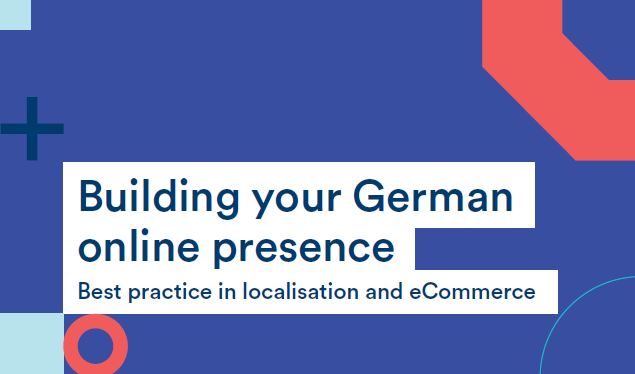
Selecting the route to market can be one of the main challenges for any business looking to export to Germany. While in the past there may have been a preferred or single route to market, businesses are achieving success using multi-channel approach to engage the market at different levels.
Enterprise Ireland’s team in Germany has seen the importance of online to not only sell products and services but also to support the German customer in their buying journey. Buying decision are often made well in advance of the first contact. Your online presence is a key factor in informing and influencing your customer about your business and why they should consider you for their needs.
Enterprise Ireland has vast experience in advising businesses on German customers’ perspectives and expectations and how to develop an effective German online presence. In conjunction with Glocafy, Enterprise Ireland has developed this Best Practice guide with sectoral insights and advice from companies already trading in Germany.
Help your business to succeed locally, download your Best Practice Guide to Building your German online presence.
Scale 21 – Helping businesses to get established in the UK
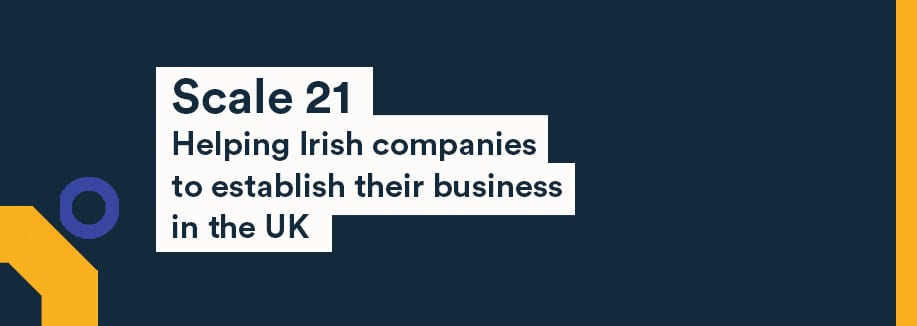 The UK has always been and remains Irelands largest single trading partner with a wealth of opportunities for Irish companies.
The UK has always been and remains Irelands largest single trading partner with a wealth of opportunities for Irish companies.
To support Irish companies to establish themselves in the UK, Enterprise Ireland has run the Scale UK mentoring programme since 2012.
This year’s Scale 21 invites companies to advance their businesses by finessing their strategies, developing their UK messaging, analysing their sales channels and becoming pitch ready with inputs from our experienced mentors.
Download more information on Scale 21 or watch our programme overview below.
Gain insights from a previous participant and mentor who discuss their experiences with Scale UK.
Gillian Doyle, CEO Cerebreon discusses her experience of participating on Scale UK and gives her advice for companies applying for next year’s programme.
Carol Ward, President at Man GLG and Scale UK mentor shares her experience of Scale UK, working with fellow mentors and Irish diaspora and the importance of supporting companies with growth ambition for the UK.
To learn more about the Scale 21 programme download our guide.
Portwest – targeting new markets with GradStart
“Bringing linguistic graduates onboard allowed us to bring in talent that could research Spanish and French speaking territories, and open opportunities for our sales teams, which contributed to our target of 20% growth.”
Deirdre Clarke, HR Manager, Portwest
Overview:
- Portwest is a market leader in the design and manufacture of stylish, comfortable, high-quality workwear that meets recognised international standards.
- With customer support staff in over 120 countries, the company used Enterprise Ireland’s GradStart initiative to attract fresh graduate talent with French and Spanish language skills to research new markets and drive business activity.
- The GradStart programme offers salary support of up to 70% for the employment of graduate talent to assist companies when expanding into new markets.
Overview:
- Portwest is a market leader in the design and manufacture of stylish, comfortable, high-quality workwear that meets recognised international standards.
- With customer support staff in over 120 countries, the company used Enterprise Ireland’s GradStart initiative to attract fresh graduate talent with French and Spanish language skills to research new markets and drive business activity.
- The GradStart programme offers salary support of up to 70% for the employment of graduate talent to assist companies when expanding into new markets.
1. What attracted you to get involved in GradStart?
We are very fortunate to have a great Development Advisor (DA), who consistently keeps us informed of programs which may be of benefit to our specific business. As we had already taken part in the similar G4IG program, we felt that GradStart would be another fantastic initiative from Enterprise Ireland to help with the development and international growth of our business. At that time we were also in the process of developing a formal Portwest Graduate Program. The timing was ideal for us as GradStart gave us the additional option of introducing a linguistic element to this program.
2. What did GradStart allow you to do that you wouldn’t have done otherwise?
GradStart allowed us to provide opportunities to newly qualified graduates at our headquarters here in the West of Ireland, and to include a linguistic dimension to our commercial team which up to now was 100% English speaking. We now have two talented graduates with French and Spanish capabilities who are able to help us explore new market opportunities In particularly across South America and Mexico.
3. What challenges and/or opportunities did GradStart help you address?
We had struggled with the exploration of non-English speaking markets. Bringing linguistic graduates onboard allowed us to bring in talent that could research Spanish and French speaking territories, and open opportunities for our sales teams, which contributed to our target of 20% growth. In turn, this allowed us to provide further job opportunities in these regions as we were able to justify the recruitment of sales staff to follow through on the opportunities identified by our graduates.
4. Which areas of the business did the graduate contribute to?
Market research and explorative work in heretofore unexplored territories. This is ongoing and while GradStart partially funds the salaries for such graduates for a two year period, we would envisage the continuation of such due to the success of these roles and how the program helps contribute to Portwest’s growth.
5. Were there any learnings from your participation in GradStart that you have taken forward into your business.
We have learned that only hiring experienced staff with x years’ experience in x industry can be limiting. Hiring graduates with their fresh approach and up to date knowledge of their areas of expertise can truly contribute in a meaningful way to our corporate goals. Furthermore, the satisfaction of being able to bring these graduates straight from college to management roles within such a short space of time is highly rewarding for any employer. We currently have graduates in managerial positions in our sites in Australia, USA and HQ and will look to add Europe and the UK to this as part of our 2020 Graduate program.
6. Would you recommend GradStart to your business peers? If so, why?
This is a fantastic way to introduce a graduate program to your company if you do not already have one. We had previously brought in graduates on an ad hoc basis, but between G4IG and now GradStart, this meant that we were able to formalise a program and become confident in our offering. This is a fantastic opportunity for any graduate looking to kick-start their career and with Enterprise Ireland funding, it is wonderful that businesses can get involved in such a great initiative.
7. Which languages were the graduates skilled in?
French and Spanish.
8. Have you stayed in touch with the graduate?
Yes – our graduates are still with us as they joined us in September 2019 for a two year period. One graduate will remain on site here at Portwest HQ while the other, following an initial training period at Portwest headquarters, has now relocated to our Kentucky office where they will continue to work with our Sales, Commercial and Marketing teams on exploring new markets. We see this as an ongoing project now, and a model which we would hope to continue after our current GradStart program is complete.
Learn more about GradStart and how it can support your business growth.


